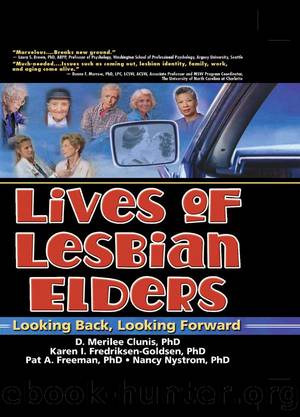Lives of Lesbian Elders by Garner J. Dianne;Clunis D. Merilee;Freeman Pat A.;Nystrom Nancy M.;Fredriksen-Goldsen Karen I.;

Author:Garner, J. Dianne;Clunis, D. Merilee;Freeman, Pat A.;Nystrom, Nancy M.;Fredriksen-Goldsen, Karen I.;
Language: eng
Format: epub
ISBN: 1743948
Publisher: Taylor & Francis Group
Chapter 5
Aging and Hopes for the Future
I think old age is a marvelous time of life⦠and I feel like I'm going to keep on as long as I live. I don't have any fears of growing old; I am old. And I'm happy about that.
Kay, age seventy-one
Aging and old age are relative concepts. What is considered âold ageâ is dependent upon the century and era in which one was born. Historically, life expectancy was short, infant mortality was high, and poor nutrition, accidents, rudimentary medicine, and diseases of epidemic proportions ensured that the life span remained relatively short. By the mid-1800s a growing middle class, better access to food, improved medical care, and health education efforts began to reduce mortality rates for children and adults. But it was not until after World War I, and the subsequent advances in medicine and technology, that old age and the social concepts that we now associate with aging emerged.
In 1789 life expectancy in the United States for males was 34.5 years and for females, 36.5 years. By 1897 it was 44.09 for males and 46.61 for females. By 1929 it had risen to 58.11 and 61.36 respectively for males and females. Now, at the beginning of the twenty-first century, the proportion of the population that is sixty-five and older is projected to rise to more than 20 percent of the population by 2040. The proportion that is eighty-five and older is growing especially quickly, more rapidly than any other segment of the population. As life expectancy increases, age-related experiences and concerns change.
We asked the women in this study about their own experiences as they age, their anticipations about growing older as well as their concerns and their hopes for the future. In response to our questions, the women reflected upon their lives, where they are today, what they might face in the future, and the advice they would offer to others. They shared their journeys in relation to their own aging and the challenges they face, particularly in relation to physical health, cognitive abilities, maintaining independence, and potential care and housing needs. They expressed their anticipations and worries about having sufficient resources for their later years as well as about their physical limitations, their relationships, and their mortality. Many of the women also discussed their hopes for the future, offering a glimpse of the importance of their dreams. They shared their deep satisfaction with their lives and some of the joys of aging. For some, being old meant finally having the freedom to be themselves. For others, aging meant basking in the security of a long, lasting love relationshipâbut knowing it too must end.
Download
This site does not store any files on its server. We only index and link to content provided by other sites. Please contact the content providers to delete copyright contents if any and email us, we'll remove relevant links or contents immediately.
Spell It Out by David Crystal(35852)
Life for Me Ain't Been No Crystal Stair by Susan Sheehan(35539)
Cecilia; Or, Memoirs of an Heiress — Volume 1 by Fanny Burney(32068)
Cecilia; Or, Memoirs of an Heiress — Volume 3 by Fanny Burney(31463)
Cecilia; Or, Memoirs of an Heiress — Volume 2 by Fanny Burney(31413)
The Great Music City by Andrea Baker(30794)
Professional Troublemaker by Luvvie Ajayi Jones(29425)
We're Going to Need More Wine by Gabrielle Union(18641)
Twilight of the Idols With the Antichrist and Ecce Homo by Friedrich Nietzsche(18305)
The Secret History by Donna Tartt(18197)
All the Missing Girls by Megan Miranda(14774)
Cat's cradle by Kurt Vonnegut(14773)
Pimp by Iceberg Slim(13792)
Bombshells: Glamour Girls of a Lifetime by Sullivan Steve(13696)
Fifty Shades Freed by E L James(12923)
Talking to Strangers by Malcolm Gladwell(12888)
Norse Mythology by Gaiman Neil(12848)
The Social Justice Warrior Handbook by Lisa De Pasquale(11957)
Underground: A Human History of the Worlds Beneath Our Feet by Will Hunt(11844)
